Singapore: house prices rising strongly, but challenging year awaits
The private residential property index rose by 7.86% during 2018, a sharp improvement from meagre growth of 1.09% in 2017, according to the Urban Redevelopment Authority (URA). When adjusted for inflation, house prices rose by 7.32% y-o-y last year.
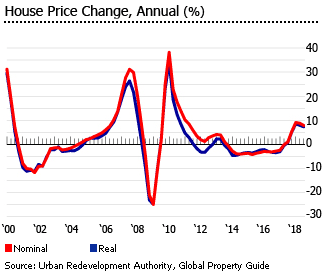
During the latest quarter (i.e. q-o-q in Q4 2018), residential property prices were almost unchanged.
All regions saw rising house prices:
- In Core Central Region (CCR), prices of non-landed private residential properties rose by 6.7% (6.2% inflation-adjusted) during 2018, according to URA. However, prices dropped 1% (-0.9% inflation-adjusted) during the latest quarter.
- In the Rest of Central Region (RCR), property prices were up by 7.4% (6.9% inflation-adjusted) during 2018. Quarter-on-quarter, prices increased 1.8% (1.9% inflation-adjusted) in Q4 2018.
- In Outside Central Region (OCR), property prices rose by 9.4% (8.8% inflation-adjusted) during 2018. During the latest quarter, prices increased 0.7% (0.8% inflation-adjusted).
Housing sales down last year, but from a record high
Home sales, including new sales, sub-sales and resales, fell by 11.5% in 2018 to 22,139 units, according to URA. Despite this, it was the second highest sales level recorded since 2013.
“Although latent demand is strong, the cooling measures have moderated the rate of sales and developers must now price with finesse according to their projects’ attributes,” said Alan Cheong of Savills Research.
Residential construction is rising strongly. In 2018, there were 8,769 uncompleted private residential units launched in Singapore, up from 6,020 units in 2017, and 7,877 units in 2016, according to URA.
With new market-cooling measures, demand is expected to be subdued this year while house prices are projected to either increase slightly or remain steady. An economic slowdown caused by the US-China trade war is also expected to adversely affect the housing market.
“Private property prices are now a lot more expensive, which has turned away some buyers,” said Chris Koh of property firm Chris Koh International. “We could see private home prices increase by 2% to 3% in 2019, which means only an increase of 0.1% to 0.5% per quarter,” Koh added.
Singapore’s economy grew by 1.9% in Q4 2018, the lowest y-o-y growth since Q4 2015, mainly due to a decline in the manufacturing and exports sector amidst the US-China trade war, according to the Ministry of Trade and Industry (MTI). Overall, the economy expanded by 3.2% in 2018, a slight moderation from the 3.9% growth in 2017. The economy is expected to expand by less than 2.5% this year.
Foreigners have been able to buy any apartment without prior government approval since the Residential Property Act of July 19, 2005. However, foreigners still cannot purchase vacant land and landed properties without permission from the Singapore Land Authority. Non-residential property is not subject to these ownership restrictions.
Prices of newly-launched developments are up
These are the prices in some of the newly launched residential developments in Singapore (based on a Savills report):
In Core Central Region (CCR):
- In 3 Cuscaden, located in Cuscaden Walk, prices of residential units range from SGD 3,385 (USD2,507) to SGD 3,831 (USD2,837) per sq. ft. in Q4 2018
- In 10 Evelyn, located in Evelyn Road, residential units are priced at about SGD 2,480 (USD1,837) per sq. ft. in Q4 2018
- In Petit Jervois, situated in Jervois Road, residential properties are sold for SGD 2,892 (USD2,142) per sq. ft.
In the Rest of Central Region (RCR):
- In Arena Residences, located in Guillemard Crescent, prices range from SGD 1,322 (USD979) to SGD 1,924 (USD1,425) per sq. ft.
- In Kent Ridge Hill Residences, located in South Buona Vista Road, prices range from SGD 1,450 (USD1,074) to SGD 1,839 (USD1,362) per sq. ft.
- In Parc Esta, located in Sims Avenue, prices range from SGD 1,509 (USD1,117) to SGD 1,882 (USD1,394) per sq. ft.
- At The Ramford, located in Rambai Road, prices range from SGD 1,450 (USD1,074) to SGD 1,686 (USD1,249) per sq. ft.
- At The Woodleigh Residences, located in Bidadari Park Drive, prices range from SGD 1,926 (USD1,426) to SGD 2,318 (USD1,717) per sq. ft.
In the Outside Central Region (OCR):
- In Belgravia Green, located in Belgravia Drive, OCR, prices range from SGD 840 (USD622) to SGD 944 (USD699) per sq. ft.
- In Whistler Grand, located in West Coast Vale, OCR, prices range from SGD 1,228 (USD909) to SGD 1,575 (USD1,166) per sq. ft.
Singapore government will firmly restrain property prices
The moderation of house prices over the past four years is the result of deliberate government policy.
Before and after the global economic crisis, Singapore’s property market surged, and Singapore experienced an amazingly overheated market. The residential property price index rose 38.2% during the space of only one year to Q2 2010 (34% inflation-adjusted).
The Singapore government sensibly took steps, and when these turned out to be not enough, took further measures.
In October 2012 it limited the mortgage term to 35 years, and lowered loan-to-value (LTV) ratios to 60% for loans longer than 30 years (or loans stretching beyond age 65).
This was only the first of 10 rounds of property-market cooling measures.
Seller’s stamp duty (SSD) was then introduced on owner-occupied housing sold within a year of purchase. A little later, the stamp duty was revised upwards, with sales of owner-occupied houses taxed sold within a year of acquisition taxed at 16% of sale price. Then the holding period was increased from one year to four years. In subsequent rounds, LTV ratios were lowered and minimum cash down payment increased.
Despite these measures, property prices kept surging. In the sixth round, new residential loans were capped at 35 years, with existing loans over 35 years facing tighter LTV ratios. In the seventh round the government revised the additional buyer’s stamp duty (ABSD), increasing rates from 5% to 7% for Permanent Residents’ (PRs) first residential property purchase, and Singaporeans’ second residential purchase.
This resulted in a 23.5% decline in sales transactions within a year, but prices continued to surge till the end of 2013.
Eighth, ninth and tenth rounds of market-cooling measures followed.
These market-cooling measures have been effective, as evidenced by the 10% decline in property prices from 2014 to 2017.
Government relaxed property market measures in 2017
The government then partially relaxed its market-cooling measures in March 11, 2017, amid slow sales and weak economic growth.
- Stamp duty is now payable by sellers after three years of purchase, down from four years, and the rate is cut by 4% for each tier. The new rates range from 4% for properties sold in the third year after purchase, to 12% for those sold in the first year.
- The requirement that loan obligation cannot exceed 60% of gross monthly income is no longer applicable for mortgage loans with loan-to-value (LTV) ratios of 50% and below.
As a result, market sentiment improved sharply, as evidenced by a strong increase in demand – with sales in 2017 reaching 25,010 units, up 52.7% y-o-y and the biggest increase since 2009, according to URA. Low interest rates and relatively more affordable property prices have also contributed to the recent sharp increase in sales.
In 2018 the government squeezed again: higher stamp duty, tighter loan limits
Effective July 5, 2018, the Additional Buyer’s Stamp Duty (ABSD) rates were raised by 5% for all homebuyers and by 10% for entities, except for Singaporean citizens (SCs) and permanent residents (PRs) purchasing their first residential property. An additional ABSD of 5% was also introduced for developers buying residential properties for housing development.
In addition, the government also announced the tightening of the loan-to-value (LTV) limits on residential property loans from 80% to 75%.
ADDITIONAL BUYER’S STAMP DUTY (ABSD) |
||
| Rates on or before July 5, 2018 | Rates on or after July 6, 2018 | |
| SCs buying 1st residential property | 0% | 0% |
| SCs buying 2nd residential property | 7% | 12% |
| SCs buying 3rd & subsequent residential property | 10% | 15% |
| PRs buying 1st residential property | 5% | 5% |
| PRs buying 2nd & subsequent residential property | 10% | 15% |
| Foreigners buying any residential property | 15% | 20% |
| Entities buying any residential property | 15% | 25% plus additional 5% for developers |
| Source: Channel News Asia | ||
Earlier, the government raised the stamp duty on home purchases with value exceeding SGD1 million (USD740,465) from 3% to 4% in February 2018, as the apartment sales market had reached levels described by the central bank as "exuberant".
Residential property sales falling
As a result in 2018 total residential property transactions, which include new sales, sub-sales and resales, fell by 11.5% y-o-y to 22,139 units, amidst the new set of market-cooling measures, according to URA.
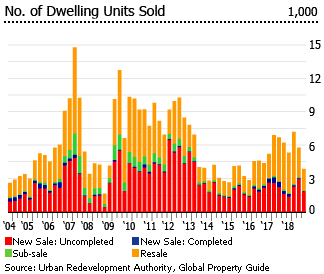
In 2018:
- Re-sales fell by 7.4% y-o-y to 13,009 units.
- Uncompleted private residential property sales were down by 7.8% y-o-y to 8,270 units.
- Completed private residential property sales plummeted by 67.2% y-o-y to 525 units.
- Sub-sales fell by 16.5% y-o-y to 335 units.
By region:
- In Core Central Region, property sales fell by 31.4% y-o-y to 3,146 units in 2018.
- In the Rest of Central Region, sales increased 5.1% in 2018 from a year earlier, to 7,991 units.
- In Outside Central Region, sales fell by 14.2% y-o-y to 11,002 units over the same period.
Interest rates are very low
Variable interest rate mortgages dominate Singapore’s housing market. Tweaking the rate on mortgages, plus government restrictions on land use and ownership, has helped pre-empt a housing boom despite sharply lower interest rates over 8-9 years.
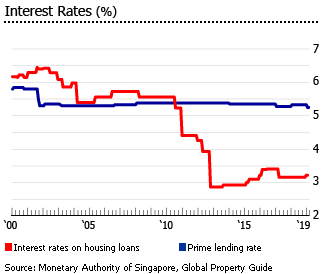
From March 2017 to November the average housing loan rate was 3.16%. according to MAS. In December 2018, it increased slightly to 3.22%.
Singapore’s mortgage market is one of the most developed in Asia. It expanded sharply during the past two decades, rising from approximately 8% of GDP in 1990, to 15% of GDP in 1996, to 27% of GDP in 2006, and to 43.9% of GDP in 2018. Outstanding housing loans were up 2% during 2018, to SG$204.3 billion (US$151.3 billion), according to the Monetary Authority of Singapore (MAS).
In Singapore, variable interest rate mortgages are pegged to Singapore inter-bank offered rate (SIBOR). A typical SIBOR-pegged adjustable rate mortgage looks like this:
| Period | Interest Rate (p.a.) |
| First Year | 0.75% + 1-Month SIBOR |
| Second Year | 0.75% + 1-Month SIBOR |
| Third Year | 1.00% + 1-Month SIBOR |
| Fourth Year Onwards | 1.25% + 1-Month SIBOR |
The mortgage interest rate therefore comprises two parts a) spread or margin b) index, typically the Singapore interbank offered rate (SIBOR).
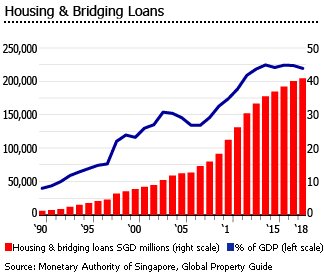
The Singapore government has other weapons in its armoury. It controls supply and zones land use through Government Land Sales (GLS) tenders. In addition, the Singapore Land Authority (SLA) restricts foreign ownership of landed property.
Residential construction is rising strongly
In 2018, there were 8,769 uncompleted private residential units launched in Singapore, up from 6,020 units in 2017, 7,877 units in 2016, 7,056 units in 2015 and 7,693 units in 2014, but still far below the 15,885 units launched in 2013, and 21,478 units in 2012, according to URA.
- In CCR, launches were up 63.8% y-o-y to 475 units in 2018
- In RCR, launches increased threefold to 4,171 units in 2018 from a year earlier
- In OCR, launches fell by 5.3% y-o-y to 4,123 units in 2018
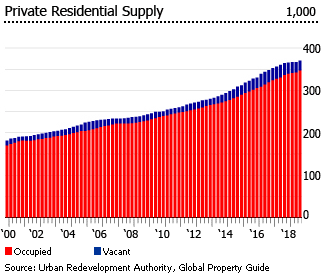
As homebuilder sentiment improves, supply is rising rapidly. Total supply in the pipeline increased 42.9% to 51,498 units in Q4 2018 from the same period last year.
- Private residential units under construction rose by 18.1% y-o-y to 27,723 units in Q4 2018.
- Planned development rose by 89.4% to 23,775 units in Q4 2018 from a year earlier.
MAJOR PRIVATE RESIDENTIAL PROJECTS COMPLETED, Q4 2018 |
|||
| Project | Location | Developer | No. of units |
| Kingsford Waterbay | Upper Serangoon View, OCR | Kingsford Property Devt Pte Ltd | 1,165 |
| North Park Residences | Yishun Central 1, OCR | North Gem Devt Pte Ltd | 920 |
| The Poiz Residences | Meyappa Chettiar Road, RCR | MCC Land (Potong Pasir) Pte Ltd | 731 |
| Principal Garden | Prince Charles Crescent, RCR | Secure Venture Devt (Alexandra) Pte Ltd | 663 |
| Symphony Suites | Yishun Close, OCR | EL Devt (Yishun) Pte Ltd | 660 |
| City Gate | Beach Road, RCR | Bayfront Ventures Pte Ltd | 311 |
| Bijou | Jalan Mat Jambol, RCR | JU-I Properties Pte Ltd | 120 |
| Sources: Savills, URA | |||
In Q4 2018, there were a total of 369,991 housing units available in Singapore, up by 1.6% from the previous quarter, according to URA. Of which 346,395 units are occupied, while the remaining 23,596 units are available, making up a 6.4% vacancy rate (down from 6.8% in the previous quarter and 7.8% a year earlier).
Yields for high-end units are very low; HDB yields are good
On the demand side, expatriate arrivals are down, due to tighter immigration policies. And a weaker homes-for-sale market has had a spillover effect on the rental market, as unsold housing inventory competes with existing rental stock.
High-end Singapore Centre condominiums yields remain poor, at around 2.5%, according to research conducted by Global Property Guide. Yields are a little higher on smaller apartments than large ones, as is typical in most property markets. But those yields alone would not be a reason for owning property in the country.
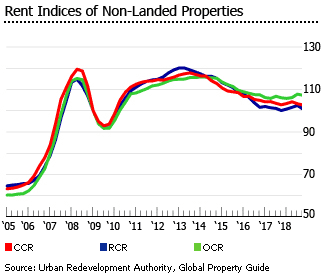
These figures are supported by Orange Tee Consultancy, which showed that the average rental yields for private condominiums in Singapore range from a minimum of 2.9% in Core Central Region to a maximum of 3.2% p.a. in the Rest of Central Region. In Outside Central Region, gross rental yields have fallen to just 3.3% recently, from 3.9% in 2012.
| Singapore Centre Condos | Cost US$ (To Buy) | Monthly Rent (US$) | Yield (p.a.) |
| 120 square metre | 1,649,760 | 3,498 | 2.54% |
| 200 square metre | 2,666,200 | 5,874 | 2.64% |
| Holland Road, River Valley Road, Orchard Road, and Tanglin Road Source: Global Property Guide | |||
However, rental yields are higher in HDB (Housing and Development Board) Towns - most of which are government-funded flats.
By early-2018 (figures are based on a recent report released by Orange Tee Consultancy):
- Central: rental yields ranged from 6.2% to 7.7% for 3-BR units; 4.4% to 5.9% for 4-BR units; and 3.6% to 4.7% for 5-BR units
- East: yields ranged from 6.1% to 6.8% for 3-BR units; 5.6% to 6% for 4-BR units; and 4.5% to 5.3% for 5-BR units
- West: yields were 6.3% to 7.6% for 3-BR units; 5.5% to 6.7% for 4-BR units; and 4.6% to 5.9% for 5-BR units
- North: yields ranged from 6.5% to 6.9% for 3-BR units; 6.4% to 6.6% for 4-BR units; and 5.2% to 5.6% for 5-BR units
- North East: yields ranged from 6.7% to 6.8% for 3-BR units; 4.9% to 6% for 4-BR units; and 4.5% to 5.3% for 5-BR units
Rents are now rising gradually. In 2018, the rental index of private all-residential properties rose by 0.6% from a year earlier (0.1% inflation-adjusted), an improvement from y-o-y declines of 1.9% in 2017, 4% in 2016, and 4.6% in 2015, according to the URA. However, during the latest quarter, the overall rental index dropped 1% q-o-q (-0.9% inflation-adjusted).
During 2018, rents for landed and non-landed properties increased by 2% and 0.4%, respectively.
In the luxury market, the Savills basket of high-end non-landed private residential rents fell slightly by 0.5% y-o-y in 2018, to an average of SGD 4.05 (USD 3) per sq. ft. per month.
Rent movements vary in Singapore’s three regions during 2018:
- rents fell slightly by 0.1% y-o-y in Core Central Region
- rents rose by 1.1% y-o-y in the Rest of Central Region
- rents rose by 0.7% y-o-y in Outside Central Region
Since 2014 many accessible and spacious condominiums have been built in the Outside Central. Many expatriates have relocated from Core Central Region to suburban and fringe areas in Outside Central Region, according to Joseph Tan, CBRE’s executive director (residential).
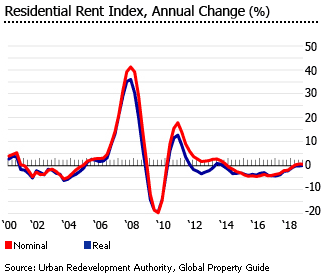
"Nevertheless, there is still this crème de la crème of senior management and business owners who are inelastic to rental increases and where uber high-end, luxury residential remains their only choice of residence. Core Central Region was meant for the deep-pocketed expatriate. For this category of tenants, only a select number of developments in the Draycott, Claymore and Nassim areas would meet their needs and hence rents in these developments are unlikely to budge from their elevated levels", said Savills Research.
Singapore has a small private rental sector, mostly serving expatriates. In the local sector 81% of all rental units are owned by the HBD.
99-year leasehold properties have the highest rental yields in Singapore because of their lower prices relative to other types of properties.
Foreign demand is crucial
More than 38% (2.16 million) of Singapore’s population are foreigners, the sixth-highest percentage of foreigners in the world. Of these 9% (o.52 million) are permanent residents, and the remaining 29% (1.64 million) expats, according to the Department of Statistics.
Tighter immigration rules are being imposed by the government, due to strong popular disquiet. Beginning 1 September 2015 work pass holders need to meet a minimum fixed monthly salary of SG$5,000 (US$ 3,778) to sponsor the stay of their spouse/ children here (on Dependant’s Pass) and a minimum fixed monthly salary of SG$10,000 (US$7,400) to sponsor the stay of their parents here (on Long Term Visit Pass).
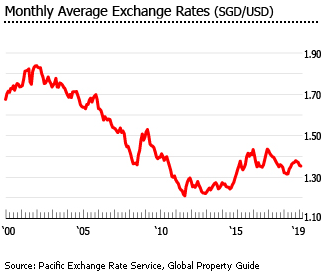
Aside from the tighter immigration rules, the recent round of market-cooling measures has eased demand from foreign homebuyers. In 2018, condo sales transactions by Singapore permanent residents (PRs) fell by 15.2% y-o-y to 3,225 units and by 20.9% to 1,212 units for non-permanent residents (NPRs), according to Edmund Tie & Company (ETCo).
“The number of properties acquired by foreign buyers in H1 2018 was similar to H2 2017. However, purchases by both SPRs and NPRs dropped significantly by more than 32% in H2 2018 compared to H1 2018,” said ETCo.
In 2018, PRs and NPRs accounted for 16.7% and 6.3% of condo purchases, respectively.
The Kingsford Hillview Peak, near the Hillview MRT station, and the Cairnhill Nine, located in the Orchard Road district are among the most preferred residential projects among PRs and foreign homebuyers.
Mainland Chinese buyers, Malaysians, Qataris, Indonesians, Americans and Indians make up the largest groups of non-Singaporean homebuyers in the country.
Singapore citizens and Singapore Permanent Residents pay a lower additional buyer’s stamp duty on residential property acquisitions than foreigners, depending on the number of properties owned. For Singapore citizens and Singapore Permanent Residents, the maximum rate of additional buyer seller duty is 15%. For foreigners it is a flat rate of 20%.
US citizens are however treated the same as Singapore citizens under the US-Singapore Free Trade Agreement, that is, no additional buyer’s stamp duty is payable on the first Singapore residential property purchase.
Economic slowdown, falling unemployment
Singapore’s economy grew by 1.9% in Q4 2018 from the same period last year, the lowest y-o-y growth since Q4 2015, mainly due to a decline in manufacturing and exports sector, amidst the US-China trade war, according to the Ministry of Trade and Industry (MTI). Overall, the economy expanded by 3.2% in 2018, a slight moderation from the 3.9% growth in 2017.
The economy is expected to expand below 2.5% this year.
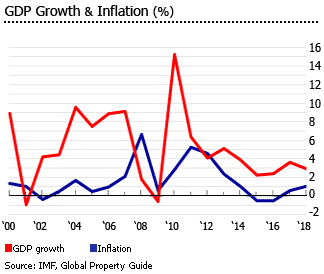
Unemployment stood at 2.1% in 2018, down from 2.2% the previous year, according to the Ministry of Manpower (MOM). Unemployment among Singaporeans was 3% in 2018, down from 3.3% a year earlier. Retrenchments fell to 10,730 in 2018, from 14,720 in the previous year.
Inflation was 0.4% in January 2019, from 0.5% in December 2018 and 0.3% in November 2018, according to Statistics Singapore. Recently, MTI and MAS issued a joint statement revising down their 2019 inflation forecast from 1%-2% to 0.5%-1.5%, amidst a decline in global oil prices.
In October 2018, the country’s central bank, the Monetary Authority of Singapore (MAS), tightened its monetary policy – the first time in six years. This is consistent with a gradual appreciation of the Singapore dollar nominal effective exchange rate (S$NEER) policy band to ensure medium-term price stability, said the central bank.
The average exchange rate in February 2019 was USD1 = SGD1.3537, a slight appreciation from USD1 = SGD1.4138 two years ago.
“Overall, against a backdrop of cooling economic momentum with the risks tilted to the downside, we believe there will be little impetus for further tightening in 2019,” said Sian Fenner of Oxford Economics.
Sources:
- World Economic Outlook Database (International Monetary Fund): https://www.imf.org/external/pubs/ft/weo/2018/02/weodata/index.aspx
- Release of 4th Quarter 2018 real estate statistics (Urban Redevelopment Authority): https://www.ura.gov.sg/Corporate/Media-Room/Media-Releases/pr19-05
- Other Financial Statistics (Monetary Authority of Singapore): http://www.mas.gov.sg/Statistics/Other-Statistics.aspx
- Table 1.5A Banks: Loans and Advances of DBUs to Non-Bank Customers by Industry (Monetary Authority of Singapore): https://secure.mas.gov.sg/msb-xml/Report.aspx?tableSetID=I&tableID=I.5A
- Summary Table: Unemployment (Ministry of Manpower): https://stats.mom.gov.sg/Pages/Unemployment-Summary-Table.aspx
- Singapore unemployment rate dropped to 2.9% in 2018 (Singapore Business Review): https://sbr.com.sg/hr-education/news/singapore-unemployment-rate-dropped-29-in-2018
- Singapore Inflation Rate (Trading Economics): https://tradingeconomics.com/singapore/inflation-cpi
- Singapore Tightens Monetary Policy on Steady Growth Outlook (Bloomberg): https://www.bloomberg.com/news/articles/2018-10-12/singapore-tightens-monetary-policy-amid-steady-growth-outlook
- Residential Sales (Savills Research): http://pdf.savills.asia/asia-pacific-research/singapore-research/singapore-residential/singapore-residential-sales-briefing-q4-2018.pdf
- You wouldn’t own a Singapore condominium for rental yields! (Global Property Guide): https://www.globalpropertyguide.com/Asia/Singapore/Rental-Yields
- Private Residential Market – Real Estate Data Trend Q4 2018 (Orange Tee): https://blog.orangetee.com/market-analysis-news/private-residential-market-real-estate-data-trend-q4-2018/
- Real Estate DataTrend HDB resale transaction volumes at highest level since 2012 (Orange Tee) https://www.orangetee.com/Home/ResearchPath/HDBMarketPulse4Q17.pdf
- Residential Leasing (Savills Research): http://pdf.savills.asia/asia-pacific-research/singapore-research/singapore-residential/singapore-residential-leasing-briefing-q4-2018.pdf
- Singapore’s central bank further tightens monetary policy, allowing Singdollar to appreciate (Today): https://www.todayonline.com/singapore/singapores-central-bank-further-tightens-monetary-policy-allowing-singdollar-appreciate
- Population and population structure (Department of Statistics Singapore): https://www.singstat.gov.sg/find-data/search-by-theme/population/population-and-population-structure/latest-data
- Condo purchases by foreign buyers crashed 20.9% to 1,212 units in 2018 (Singapore Business Review): https://sbr.com.sg/residential-property/in-focus/condo-purchases-foreign-buyers-crashed-209-1212-units-in-2018
- New property cooling measures announced: Higher ABSD rates, tighter loan limits (Channel News Asia): https://www.channelnewsasia.com/news/singapore/singapore-property-cooling-measures-higher-absd-rates-loan-limit-10502710
- Don’t expect Singapore’s private home prices to match growth of 2018: Experts (Channel News Asia): https://www.channelnewsasia.com/news/singapore/private-home-prices-2019-outlook-growth-2018-11079606